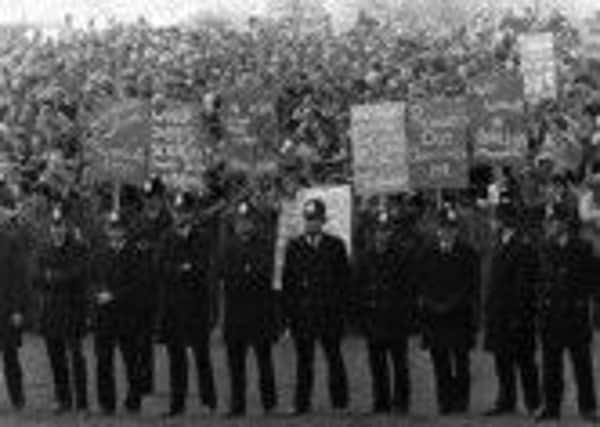Apology refused over miners’ strike


The Prime Minister told the Commons the only person who ought to be apologising for their role in the strike was National Union of Mineworkers President Arthur Scargill “for the appalling way in which he led that union”.
Growing number of Labour MPs have been demanding a Government apology over the strike after Cabinet papers released earlier this month under the 30-year rule revealed Margaret Thatcher’s Conservative regime had secret plans to close 75 pits – and even considered sending in troops to break the strike.
Advertisement
Hide AdAdvertisement
Hide AdSpeaking in the Commons yesterday, Barnsley East MP and Labour’s Shadow Cabinet Office Minister Michael Dugher said the pain still felt in areas such as South Yorkshire will not heal until the Government intervenes.
In particular, Labour want full disclosure about the Government’s involvement in the so-called Battle of Orgreave, a notorious incident in South Yorkshire in June 1984 when police fought running battles with picketers.
“In light of the newly released Cabinet papers, and given the continued sense of injustice that prevails across the coalfields, will the Minister agree to publish all the documents and the communication between the then Government and the police at the time of the strike; to a full investigation into the events surrounding Orgreave ahead of the 30th anniversary; and to make a formal apology for the actions of the then Government?” Mr Dugher asked.
“It is only through full transparency and reconciliation that we will finally see justice for the coalfields.”
Advertisement
Hide AdAdvertisement
Hide AdBut his request was given short shrift by Conservative Ministers who made clear their own memories of the highly-politicised dispute are markedly different from those of many Labour MPs.
“The documents will be released in the usual way, under the law that was passed under the last Government,” said Cabinet Office Minister Francis Maude, who was an MP in Warwickshire for much of the 1980s.
“I was representing a coal mining constituency during the miners’ strike, and saw at first hand the violence, intimidation and divided communities in a dispute that took place without a proper national ballot being held. The Honourable Gentleman asks for an apology – no.”
Speaking later at Prime Minister’s Questions, Mr Cameron made clear there are no plans for any additional release of papers along the lines of the special inquiry panel the last Labour Government set up into the Hillsborough disaster.
Advertisement
Hide AdAdvertisement
Hide Ad“We now have a system for releasing paperwork from 10, 20 and 30 years ago, and we should stick to that,” Mr Cameron said.
“I have to say that if anyone needs to make an apology for their role in the miners’ strike, it should be Arthur Scargill for the appalling way in which he led that union.”
He also highlighted the role of former Labour leader Michael Foot, adding: “If we want to ask about other people’s roles, there was the role of the then leader of the Labour party, who at the time never condemned the fact (the union) would not hold a ballot.
“I think there are lessons for Labour to learn.”
But Mr Dugher said the Government’s response was typical of the Tory attitude to the strikes.
Advertisement
Hide AdAdvertisement
Hide Ad“David Cameron showed he just doesn’t care about the coalfields,” he said. “His attitude is typically ignorant and belligerent. He is also failing to put right past wrongs. The belligerent response from current Ministers shows it’s a case of the same old Tories.”